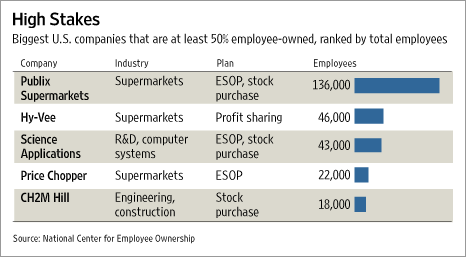You are here
Tribune Staff Would Bear Risk in Financing Buyout
Tax Breaks Abound, But Business Slump Could Hurt Workers
The best thing about an employee-stock-ownership plan is that it gives workers a stake in their company's future. Which is also, of course, the worst thing about it.
That may never be more apparent than in the $8 billion sale of Tribune Co., under negotiation over the weekend. Both bidders -- Chicago real-estate magnate Sam Zell is vying against the duo of Los Angeles businessmen Ron Burkle and Eli Broad -- propose using an ESOP representing Tribune's 21,000 employees to take a majority stake in the company. While use of an employee share plan offers the company's suitors a powerful tool to finance the deal, including attractive tax breaks, it can pose significant risks for the company as well as its employees.
"It's a tax-and-financing tool," said Mary Josephs, senior vice president for ESOP financial services at LaSalle Bank, a unit of ABN Amro Holding NV, in Chicago. "But you cannot ignore the human-resources side of it if you want it to work for the long run."
Financing a deal in part with an ESOP works because the employee-benefit plan invests almost exclusively in the employer's shares. And because ESOP deals can involve the newly private company going heavily into debt, employees can see their retirement benefits eroded if the business is hurt by an industry downturn. That is a real danger for Tribune, owner of the Los Angeles Times, Chicago Tribune, Newsday of Long Island and a string of other newspapers and TV stations, struggling to cope with a severe slump in the newspaper business.
Some major ESOP transactions have foundered, perhaps most notably at United Airlines. In 1994, the airline's pilots, managers and machinists acquired 55% of the company through an ESOP in return for six years of wage and benefit cuts, part of an effort to save jobs. Labor-management tensions remained high, however, and ESOP consultants say too little effort went into fostering a cooperative workplace. Employees lost control of the company in 2003, and United employees lost much of their stakes as the airline the industry struggled after the Sept. 11, 2001, terrorist attacks.
Even so, ESOPs appear to be gaining popularity, Ms. Josephs said. Her firm has $5 billion of transactions in its pipeline, five times its 20-year average, including three public companies and three private-equity transactions. "The ESOP is highly competitive," she said.
The proposed buyout of Tribune is expected to be a standard ESOP deal. In one typical scenario, Tribune would borrow cash from banks or other lenders and then immediately lend it to a newly created ESOP. The ESOP, in turn, would use the cash to buy out existing shareholders.
That leaves the ESOP owning a significant chunk of the company, and both ESOP and corporation with substantial debt. As the company contributes cash to the ESOP over time -- much as it would contribute to a 401(k) or other retirement plan -- the money is used to pay down the loans.
Because those contributions amount to principal and interest payments on loans owed by an employee-benefit plan, they are fully tax-deductible, up to 25% of payroll per year. By contrast, companies ordinarily can deduct only interest on their loans.
But the Tribune proposals could take advantage of another dramatic tax break as well, sharply reducing any federal taxes that could be still payable. That is a result of a tax break available only to companies with a limited number of owners, known as S corporations. Tribune will likely qualify for S-corporation status after the buyout, as the ESOP and either Mr. Zell or Messrs. Broad and Burkle will be its main shareholders.
Unlike other corporations, S corporations aren't taxed directly on their profits. Instead, their shareholders pay income tax on their share of each year's profits. Where an ESOP is a shareholder -- as will be the case with Tribune -- it won't pay taxes on its share of the profits because ESOPs don't pay taxes.
So, if Tribune is 70%-owned by an ESOP, that portion of each year's profits isn't taxed. Companies in this situation have an edge over competitors, able to reinvest more of their profits into operations or acquisitions, ESOP advocates say.
Tribune could try to tap employees' existing 401(k) accounts for capital in the transaction as well, by offering employees a chance to roll those assets into the ESOP, effectively investing alongside those taking the company private -- and compounding the risk the employees take on in the process. Tribune's 401(k) plans had more than $2.3 billion in assets at the end of 2005, including nearly $610 million already invested in Tribune shares.
Employees might also find their power as shareholders limited. They won't necessarily get full voting rights, for example -- ESOP participants can often be limited to voting only on the most significant decisions, including liquidations and major asset sales. Just 20% of closely held firms give ESOP participants full voting rights, according to figures from the National Center for Employee Ownership, which promotes ESOPs.
